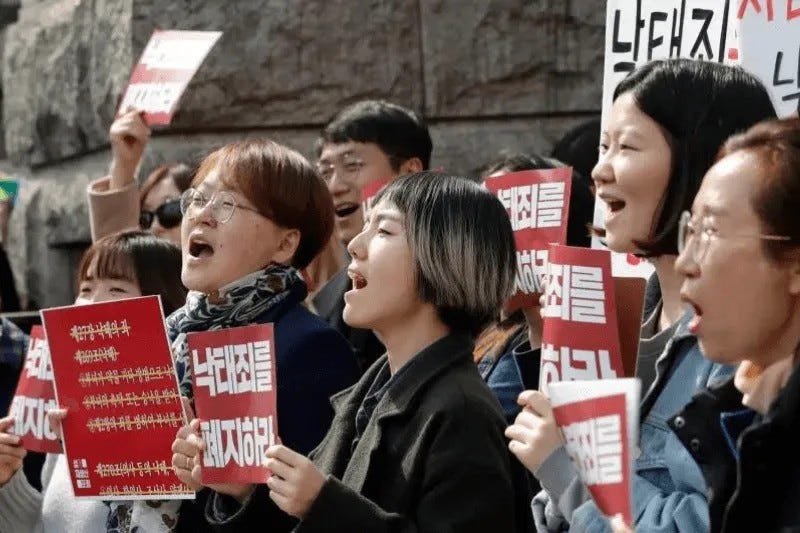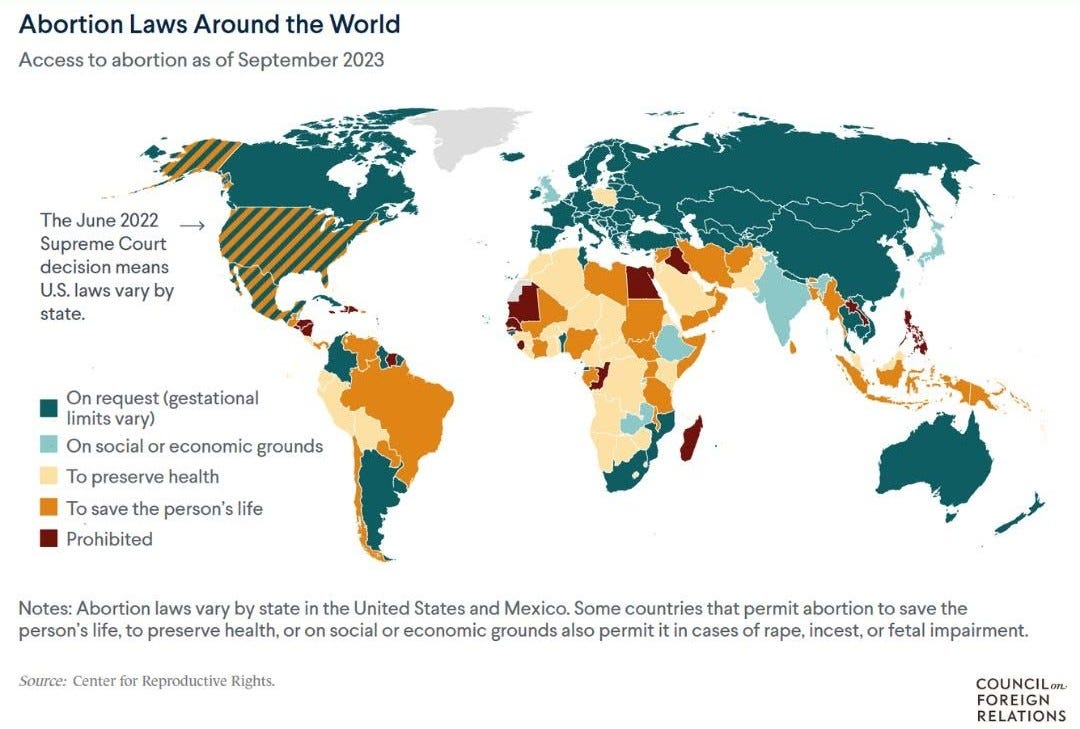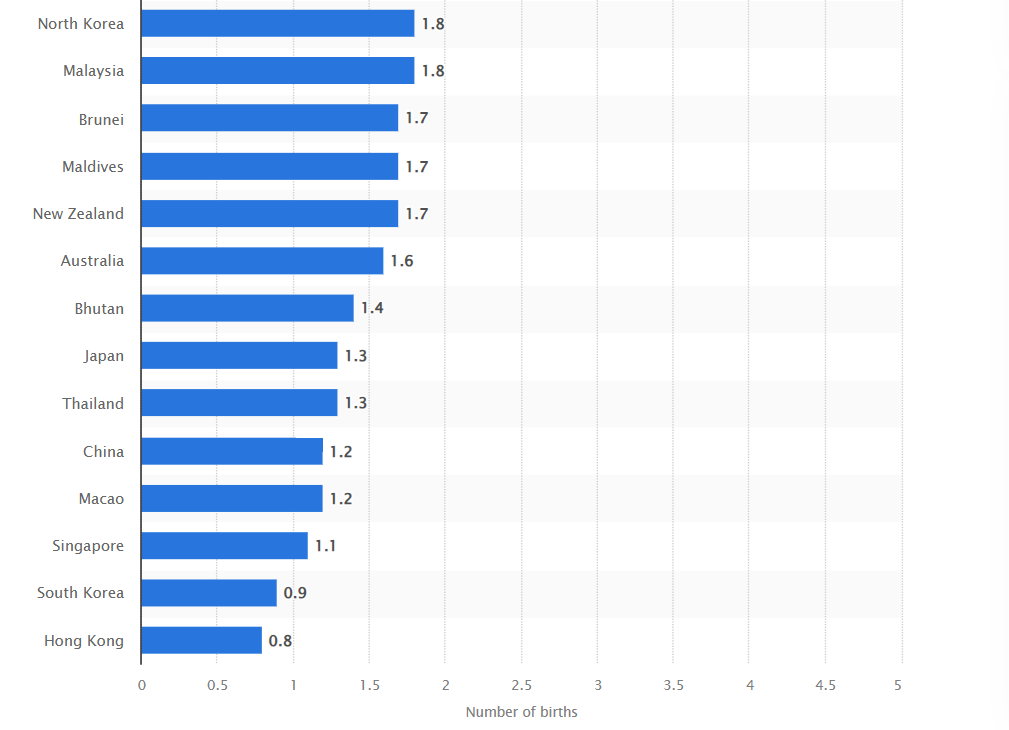Trump’s Return Invigorates Global Anti-Abortion Drive
Not everything termed ‘Geneva’ advances human rights
The global movement to undermine and restrict access to safe abortion, which went relatively dormant during the Biden interregnum that began in 2020, looks likely to return along with Donald Trump’s return to the US presidency. Although the returning president shied away from the anti-abortion crusade as a political liability during his 2024 campaign and may well remain silent domestically, internationally it is likely to return in the form of the regressive Geneva Consensus Declaration.
The Declaration was introduced two weeks before Trump left office in 2020 by his Secretary of State Mike Pompeo and adopted by 39 countries under the pretext of “promoting women’s health and strengthening the family.” The Biden administration immediately took the US out of the Declaration upon taking office. Having frustrated the anti-abortion forces in the US during his campaign, Trump is likely to make up to them on the international front, according to the medical anthropologist Lynn Morgan in a telephone conversation from Mount Holyoke College, a private women's liberal arts school in Massachusetts.
Opposition to abortion plays a major role in Project 2025, the massive planning document created by the right-wing Heritage Foundation as a guide for the incoming administration. Although Trump disavowed it during his campaign, he has picked at least seven of its authors to guide his administration. The plan’s far-reaching recommendations would severely limit reproductive autonomy and access to reproductive health care. One of the authors of Project 2025 is Valerie Huber, who gained national and international recognition during her tenure in the Trump administration by playing a pivotal role in the creation of the Geneva Consensus Declaration.
The so-called ‘consensus’ has not arisen out of any negotiations or discussions at any United Nations forums. It doesn’t reflect any global agreement. In fact, it misrepresents internationally agreed commitments that protect sexual and reproductive health and rights. By distorting the countries' obligations to the health and well-being of women, the agreement instead contravenes international women’s rights standards on health.
“It actually denies rights in the garb of ‘protection of family values’ which a lot of us in Africa value so much,” Stephanie Musho, a Kenya-based human rights lawyer and Regional Coordinator of Catalysts Africa told Citizen News Service. “So they have found perfect ways to advance their rhetoric under the pretext of protecting the family. The Geneva Consensus Declaration does not recognize the international human right to safe abortion."
The Geneva Declaration is not the only initiative sailing under a false flag. Another example is CitizenGO, a conservative and far-right anti-abortion advocacy group founded in Madrid in 2013. It claims to “promote life, family, and liberty” by working in a campaign to undermine reproductive and LGBTQI+ rights around the world. A Bureau of Investigative Journalism study illustrates how the network mixed digital campaigns, political lobbying, and protests on the ground to fight against reproductive and LGBTQI+ rights in Kenya and Ghana. CitizenGO claimed victory when legislation to extend access to abortion in Kenya was blocked, and played a key role in pushing a bill in Ghana that would impose lengthy prison sentences for LGBTQI+ people.
"The rhetoric against sexual and reproductive health and rights is increasing. We are hearing harmful narratives around ‘family systems’ and ‘traditional values’ and pro-natal narratives are emerging which are extremely dangerous,” said Debanjana Choudhuri, Executive Director of the Women's Global Network for Reproductive Rights. “Many countries in Asia are talking about their declining fertility rate and clamoring for women to bear 'more' children,” Choudhuri said. "There is a huge pressure to dilute the language around rights, equality, and equity. Anti-rights movements are highly organized and extremely well-resourced. With the imminent changes in US administration, we are anticipating backlashes.”
Of the 30 countries comprising Asia, only eight are above the replacement rate of 2.1 per woman in total fertility. In 22 of them, the number of births has fallen far below replacement, with South Korea, Hong Kong, and Singapore with some of the world’s lowest fertility rates, increasing the pressure to deny abortion as a means of limiting population growth.
East Asia outside the Muslim Malay countries is largely devoid of anti-abortion sentiment, with 53.8 million unintended pregnancies occurring each year according to the Center for Reproductive Rights, and with 65 percent of them ending in abortion. In 2021, abortion was decriminalized in South Korea after the country’s Constitutional Court ruled that making abortion a criminal offense was unconstitutional and ordered the legislature to revise the laws by the end of 2020. The judges said women and girls should have up to 22 weeks into their pregnancy to allow “sufficient time to make and carry out a holistic decision.”
The Philippines is an outlier, and although it hasn’t signed onto the Geneva Declaration, abortion is prohibited by the constitution. It took 14 years to pass a landmark Responsible Parenthood and Reproductive Health Act in 2012, and the Catholic Church has continued to oppose its implementation on the ground. Nonetheless, an astonishing 600,000 to 1.1 million illegal abortions occur annually according to the National Institutes of Health despite prison terms of up to six years for people who have abortions and for anyone who assists. In contrast, an estimated 1,026,690 abortions occurred in the United States in 2023, with a population three times as large, and where until 2022 with Dobbs v. Jackson Women's Health Organization, abortion was universally legal.
Asia being infertile ground except for the Philippines, the forces behind the Geneva Declaration have concentrated largely on Africa. Kenya’s president enacted a new policy in 2023 restricting options available to women in abusive marriages because it stigmatizes divorce, Musho said. “This new policy is advancing the anti-rights agenda and mainstreaming it in legal and policy frameworks. This so-called 'family' policy is deeply rooted in the global anti-rights anti-gender movement, which is spreading its tentacles across the African continent. They started with anti-homophobic bills and laws that have been sweeping Ghana, Uganda, Kenya, and Congo.”
Gender equality for all is enshrined in the Sustainable Development Goals (SDGs) that were adopted unanimously at the UN General Assembly in 2015. But progress is at best sketchy, and in so many aspects regressive. Unless we dismantle patriarchy, ensure racial equity, ensure justice for all gender-diverse people, ensure disability inclusion and justice, end ageism and ableism, we will not be able to end all forms of gender-based violence and deliver gender equality.
As Musho says, human rights are indivisible, and we cannot cherry-pick them. We have to collectively and collaboratively push back against the rhetorics that undermine equality and justice. To advance human rights and gender equality, all women’s rights and feminist movements, people’s struggles against oppression, and gender-based violence - all will have to come together to collectively and collaboratively push back against the rhetorics that undermine equality and justice.
Shoba Shukla, the founding Managing Editor and Executive Director of Citizen News Service (CNS), contributed to this report.






"They started with anti-homophobic bills and laws that have been sweeping Ghana, Uganda, Kenya, and Congo.”
Homophobic in the extreme I think he meant... Anti-homophobic and anti-misogynistic laws would be most welcome, but not likely, at least in the next several decades judging by how universally backward these third world nations unfortunately are...